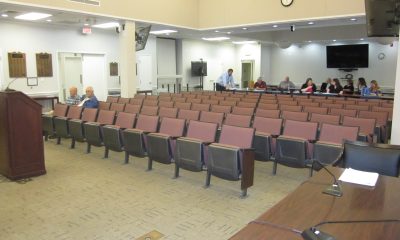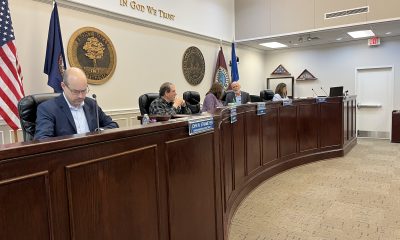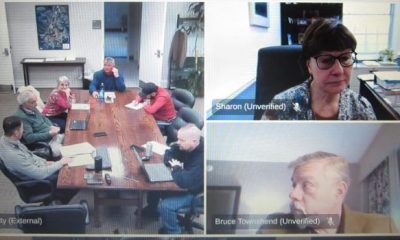Local Government
Supervisors OK audit of County’s most-recent financials without EDA info

“I contend that you folks cannot approve the 2017-2018 audit as it’s currently written,” said Jim Bond during the public comment period at the start of the BOS October 15 meeting. Photo and video by Mike McCool, Royal Examiner.
The Warren County Board of Supervisors (BOS) on Tuesday unanimously approved the County’s fiscal year (FY) 2017-2018 financial audit, despite a public plea to hold off on action until an audit of the Front Royal-Warren County Economic Development Authority’s (EDA) financials also could be included.
But information on the EDA’s financials — which currently are at the center of a major fraud and embezzlement scandal — may not be available until the end of the year.
The audit is of the Comprehensive Annual Financial Report for the County of Warren for the Fiscal Year ended June 30, 2018, which was prepared by Warren County Administrator Doug Stanley and the County’s Finance Department. The audit of the report was conducted by Robinson, Farmer, Cox Associates, which is the County’s auditing firm.
Stanley, the entire BOS, and several other local individuals were indicted on September 20 by the Warren County Special Grand Jury that’s investigating potential criminality related to the EDA financial fraud investigation and civil litigation.
One Front Royal, Va., resident took issue with that fact.
“I contend that you folks cannot approve the 2017-2018 audit as it’s currently written,” said Jim Bond during the public comment period at the start of the BOS October 15 meeting. “I think that there is a well-known material witness in the internal controls of Warren County and that needs to be recognized in the audit report. In the unlikely event that you get a clean audit report on the EDA between now and the time you approve this audit, you might have an argument. Otherwise you can’t approve it.”
Stanley and members of the BOS attempted to provide some clarity.
“As you know, we had been holding off [audit approval] pending a receipt of the EDA’s audit for the same time period,” Stanley told BOS members during the unfinished business portion of their meeting. “The EDA audit is a component unit of our audit. I reject the assertion that the county’s controls aren’t in place. The county’s processes and controls that are under the finance director and the treasurer are in place.”
For instance, as preparers of the County’s annual financial report, the Finance Department has responsibility for establishing and maintaining an internal control structure to ensure that the County’s assets are protected, according to a Dec. 21 2018 letter written by Stanley and County Finance Director Andre Fletcher that’s included in the report.
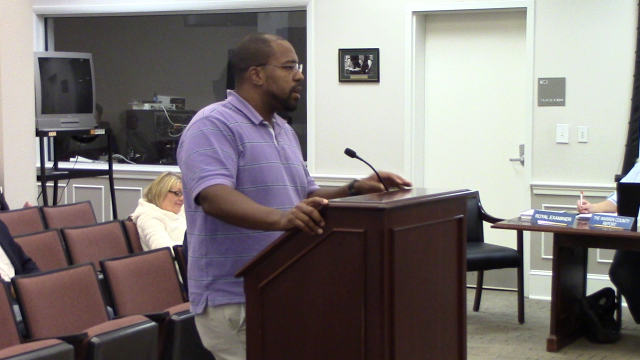

County Finance Director Andre Fletcher explains that County has safeguards in place.
“In developing and evaluating the County’s accounting system, consideration is given to the adequacy of internal accounting controls, which are designed to provide reasonable, but not absolute, assurance regarding: (1) the safeguarding of assets against loss from unauthorized use or disposition; and (2) the reliability of financial records for preparing financial statement and maintaining accountability for assets,” Stanley and Fletcher wrote.
Additionally, the County also has budgetary controls in place to ensure compliance with provisions in the annual appropriated budget that’s approved by the BOS, and “adequate controls” also exist to guarantee and document the County’s compliance with federal and state laws and regulations, according to their letter.
“Responsibility for both the accuracy of the presented data and the completeness and fairness of the presentation, including all disclosures, rests with the County,” Stanley and Fletcher wrote. “We believe the data, as presented, is accurate in all material respects.”
While BOS members received a copy of the audit just a few days prior to their Tuesday night meeting, Stanley said, “Hopefully, you’ve had time to digest it.”
“At the end of the day, the audit is what it is,” Stanley said. “It’s a statement of our finances as of June 30, 2018.”
Seemingly to support Stanley’s statement, BOS Chairman Daniel Murray read a portion of the audit known as a “disclaimer of opinion,” in which the auditing firm basically said that since it couldn’t obtain sufficient appropriate audit evidence from other auditors on the EDA, it didn’t provide an opinion on the authority’s financial statements in its audit of the County’s financials.
“So, I hope that clears up some concerns,” Murray told the audience.
Supervisor Tom Sayre, vice chairman of the BOS, pointed out that the independent auditors also reported the County’s financials to be “neutral, consistent and clear.” And he asked Stanley to explain in laymen’s terms how the EDA budget held up the audit of the County’s FY 2017-18 financials.
Stanley said the EDA isn’t technically part of the County’s budget operations, per se, “it is a separate discrete unit,” although the County does fund a portion of its operations.
Supervisor Tony Carter asked Stanley what happens when the EDA auditors come back with their report, and Stanley said that that information would be included in next year’s audit.
“We wouldn’t come back and amend this one,” said Stanley.
Sayre motioned to accept the audit and Supervisor Linda Glavis seconded it before the full board approved the audit as presented.
Watch the discussion on this exclusive Royal Examiner video:
Local Government
County Budget Work Session Addresses Staff Health Care Costs, Charging Town for Solid Waste Dumping, and Old Oak Ln. Projects
Following a 4 p.m. tour of the new Senior Center renovations slated to be completed by June (see related story) and a late-added 5:30 p.m. Closed Session (Item A), the Warren County Board of Supervisors convened to yet another Fiscal Year-2024/25 budget work session. This one, convened about five minutes after the scheduled 6 p.m. start due to the length of the closed session, included one outside agency, the Virginia Department Of Transportation (VDOT) on the Six-Year Plan for road improvements in the county, and five county departmental presentations.
Those budget-related reports in the order presented were:
- Presentation – Virginia Department of Transportation Secondary 6-Year Plan
- Discussion – Public Work Transfer Station Rates – Mike Berry, Public Works Director
- Presentation – Old Oak Lane, Phase IV (4) and V (5) Updates – Mike Berry, Public Works Director and Sanitary District Manager Michael Coffelt
- Discussion – 2024-2025 United Healthcare Insurance Renewal – Jane Meadows, Deputy County Administrator, Kayla Darr, Human Resources Manager
- Discussion – Orientation for the Department of Social Services – Jon Martz, Director of Social Services
- Requested Proclamation: April is Child Abuse Prevention Month – Department of Social Services
Since it was a work session, no actions were taken on the presentations or staff recommendations. The board took what they heard under advisement as they move toward a final budget proposal in the months leading to the start of Fiscal Year-2025 on July 1, 2024. Since no action can be taken at a work session, the Social Services Department requested proclamation on recognizing April as Child Abuse Prevention Month would be made at the board’s first meeting of May, Tuesday, the 7th of May.


County Director of Social Services Jon Martz and staffers April White and Christine Lawson outlined their programs and service number increases into the new fiscal year and requested board acknowledgment of ‘April is Child Abuse Prevention Month’.
Among highlights of those presentations and board discussion of them was a staff recommendation from Public Works Director Mike Berry to begin charging the Town of Front Royal for its use of the County’s Solid Waste Transfer Station to dump residential trash. Coupled with a $10 hike in the County’s current tipping fee of $69 to $79 at the Transfer Station, charging the Town “what other commercial users” are charged was projected to increase County revenue by $474,000 to help cover rising costs.
Another highlight came during Deputy County Administrator Jane Meadows update on renewal of the United Health Care Insurance Plan for County employees. In describing the existing situation, employee contributions to their health care coverage balanced against salaries, as well as health and age profiles of county employees, it was observed that may of the County’s employees “feel undervalued” by their employer.
Board Chairman Cheryl Cullers expressed some distress at that description of what is apparently a significant portion of the County’s staff that may be considering a move to a higher-paying or larger employer share of health care costs municipality. And while it may not be a totally new phenomena in the local governmental employer/employee relationship, it is one the board chair believes needs to be dealt with proactively in coming years. How that might be achieved without increasing County revenue through higher service rates, as suggested by the public works director regarding the Town’s use of the County’s Solid Waste Transfer Station, or general tax hikes to provide additional across the board general services revenue will be a dilemma the board must face in coming fiscal years.


County Director of Social Services Jon Martz and staffers April White and Christine Lawson outlined their programs and service number increases into the new fiscal year, as well as requested board acknowledgment of ‘April is Child Abuse Prevention Month’.
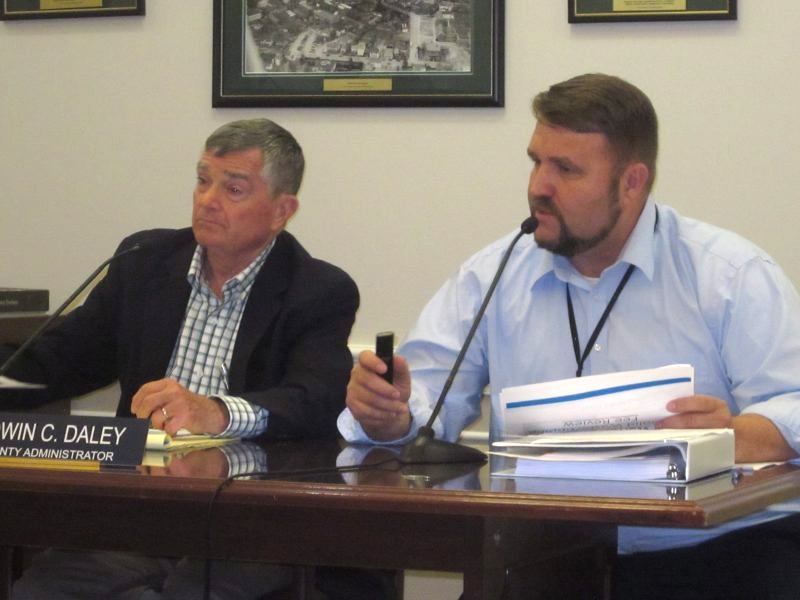

Another discussion highlight came in the updates on Old Oak Lane Phases 4 and 5 in the Shenandoah Farms Sanitary District. Staff reported ongoing issues with “production defects” of box culvert sections delivered to the County by the contracted vendor causing ongoing delays as the Phase 4 project creeps toward completion. But that completion of the Old Oak Phase 4 project cited at an approved budget of $1.6 million, with expenditures to date of $796,792, with a remaining budget of $803,208, was recommended for completion. The staff summary also noted that the County “has not paid for the Eastern Vault $249,000 invoice for station 53+00 due to the deficiencies noted.” It was further noted that Public Works has “expended $173,000 in corrective action” with more corrective repairs to come.
As for Old Oak Phase 5 more at a planning stage, due to “Design Constraints” and related costs, staff recommended that the “County Administrator should send a letter to VDOT cancelling the Old Oak Phase V (5).” However, it was added that the County Public Works Department “complete the project internally using current maintenance contracts and approved SFSD (Shenandoah Farms Sanitary District) FY24 road improvement funding.” It was added that: “County General funding no longer necessary for internal SFSD project” which might draw the attention of some Farms Sanitary District residents regarding the use of their Sanitary District tax revenue.
The Closed Session involved legal consultation on wide range of matters involving liabilities, debt, potential bank actions, and recovery of assets related to the Front Royal-Warren County Economic Development Authority (FR-WC EDA or now WC EDA) financial scandal. The motion made into the Closed Meeting read:
“I move the Board enter into a closed meeting under the provisions of Sections 2.2-3711(A)(7) and (A)(8) for consultation with legal counsel pertaining to actual or probable litigation and the provision of legal advice regarding the Industrial Development Authority of the Town of Front Royal and the County of Warren, Virginia (the “EDA”), the Town of Front Royal, the EDA vs. Jennifer McDonald, et al., the Town of Front Royal vs. the EDA, et al., the EDA vs. the Town of Front Royal, other potential claims and litigation relating to other possible liabilities of the EDA, the recovery of EDA funds and assets, the outstanding indebtedness of the EDA and potential bank actions related to the same.”
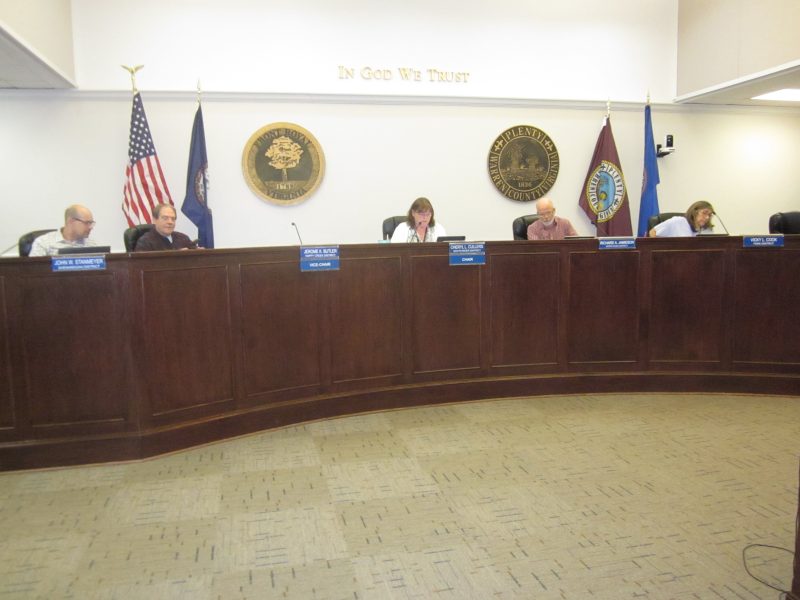

The supervisors came out of the closed session at about 6:05 p.m. to find a captive audience of mostly county staff in the rear of the meeting room, along with VDOT reps Ed Carter and Matt Smith, right to left, in the second row of public seating.


And after the above-cited agenda’s completion, the work session adjourned at 8:25 p.m.
Due to what was described as a vendor “glitch” there is some delay on the work session video being posted. County IT staff hopes the video will be posted by the end of the week. When it is available, it will be linked to this story.
Local Government
Supervisors View New Senior Center Site at Health & Human Services Complex Prior to Budget Work Session
At 4 p.m. Tuesday afternoon, the Warren County Board of Supervisors began its three-pronged April 23rd schedule with a tour of the nearly completed two-year Health & Human Services facility renovations that will see the County-overseen Senior Center relocated from its Chimney Field-area site. According to Deputy County Administrator Jane Meadows, relocation will see an approximate doubling of the size of the senior assistance and activities facility. Meadows later elaborated to us that the square footage of the new Senior Center is 5,922 s.f., with shared space with the Parks & Recreation Department adding an additional 2,780 s.f. expanding total usable space to 8,702 s.f. For comparison, the existing Senior Center on Commonwealth Avenue near Chimney Field, the building is 3,964 s.f. The two-year project cost was cited at $867,000.
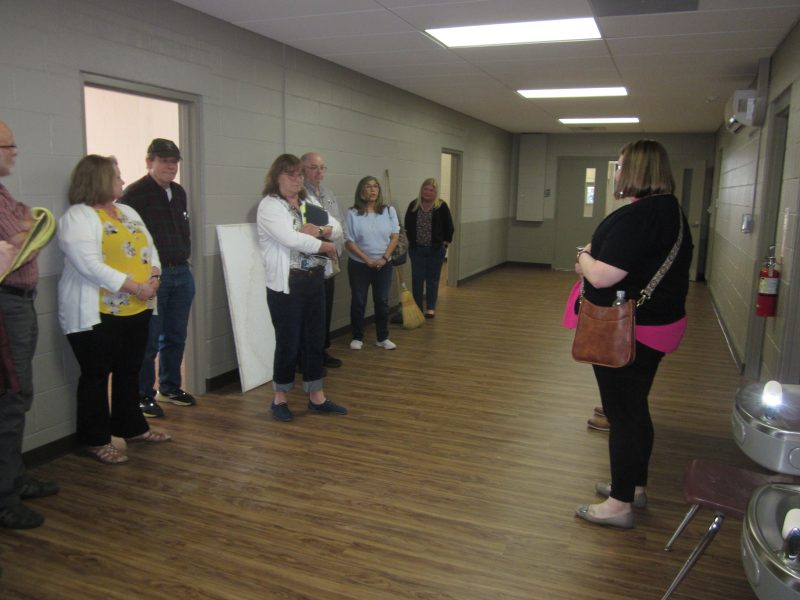

Deputy County Administrator Jane Meadows, right, gives supervisors and other involved personnel an overview of the status of the almost-ready Senior Center in a renovated portion of the County’s Health & Human Services complex off of 15th Street in Front Royal. Below are two perspectives on what appears to be a main dining area with space for other activities as needed. Royal Examiner Photos Roger Bianchini




Costs and returns on investments are high on the county supervisors’ minds right now as they zero in on a Fiscal year 2024/25 final budget that will see the county’s first tax hike in the past five years to fund crucial departmental and outside agency services. Board members new and old seemed impressed with the amount of renovated space and its condition as presented to them by Meadows, along with Senior Services personnel, a number from Seniors First, including Executive Director Jimmy Roberts, Director of Development Greg Stockton, Director of Senior Center Operations Marsha LeBrecht, and Senior Center staffer Misty Alger. Also joining the tour were County Director of Social Services Jon Martz and Assistant Director Christie Lawson.
The target date for opening the Senior Center at its Health & Human Services complex location at the old middle school site off 15th Street is sometime in June, though involved officials declined to get more specific on a precise date at this point as final renovations continue.


The Senior Center facility tour makes its way through kitchen areas with what appears to be a renovation in progress on the exhaust system hanging from the ceiling. In the third shot below, Warren Senior Center staffer Misty Alger displays a walk-in freezer for food storage in a kitchen area. Cleanliness in food preparation areas was cited and will be encouraged by multiple sink locations.


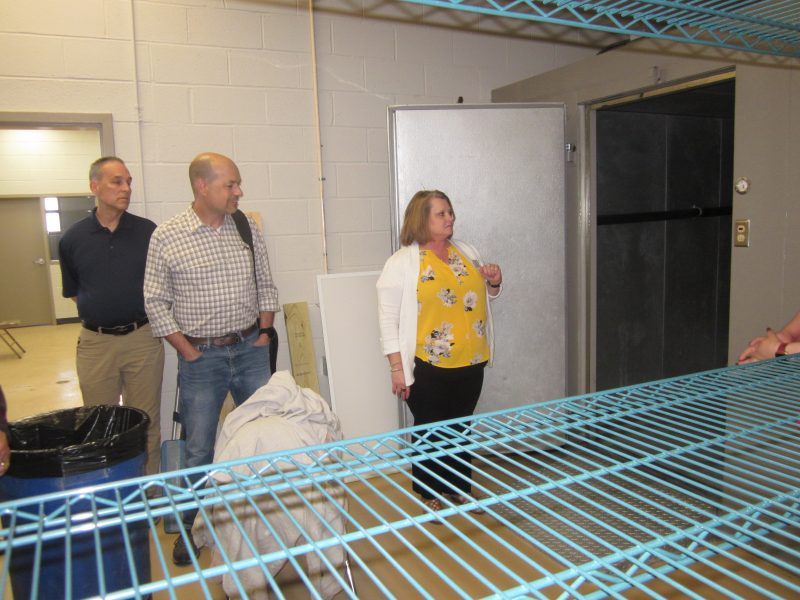

It was noted that the change of locations would also be beneficial in giving attending seniors nearby access to a number of Health & Human Services in the 15th Street complex in addition to the shared Parks & Recreation space. That access includes the County Health and Social Services Departments for assistance seniors qualify for and utilize in maintaining a more beneficial standard of living.


The group gathers at the exit from the large dining area to an outside patio area.




Meadows shows tour auxiliary rooms with work desks and a bathroom area with a walk-in shower.




Local Government
Airing of Differences in Town Council Regular Meeting Leads to Unanimous Vote to Extend Out-of-Town Service to Catholic Diocese
Every meeting of the Town Council has a scarlet thread weaving through a thicket of information. On Monday, April 22, at a regular meeting, starting at 7 p.m. in the Warren County Government Center on 220 North Commerce Avenue, the items threading the labyrinth were related to an out-of-town utility connection contract with the Catholic Diocese of Arlington for 0 Criser Road.


Town Council meets for regular meeting on the evening of April 22 at the Warren County Government Center.
Sensing what is coming next is an imprecise art in government and the status of the Diocese’s application, suffering much discussion throughout multiple work sessions of the council, lingered in a state of irresolution as it was unclear whether the church body would ultimately receive water and septic service from the town at their out-of-town location on West Criser Road, where they plan to develop a sanctuary as well as an auxiliary building to serve as a gymnasium. Still, on Monday night, to use Councilman Bruce Rappaport’s language, the issue reached the end of its road. Even if the council does not work out a boundary-line adjustment of Town corporate limits to include the parcel at 0 West Criser Road, even if the council cannot, therefore, require the applicant to build a sidewalk in accordance with the rules that would govern the development of a parcel within Town limits; and even if members of the council continue to disagree amongst themselves about the coulda, woulda, shoulda pertaining to the Diocese’ offer to offset the cost of a sidewalk, the Town can still extend service to the church body. And they did in a unanimous vote.
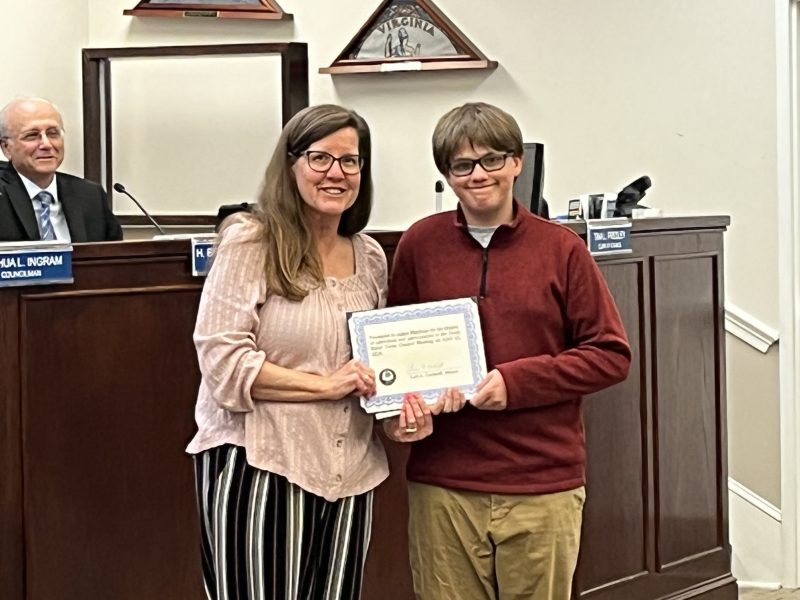

Jaden Matthiae, son of Michelle Matthiae and planning commissioner Brian Matthiae, receives a gift certificate from Mayor Lori Cockrell after he led the gathering in the pledge of allegiance.
Having placed 0 Criser Road on a list of areas outside of town that may receive service earlier in the evening in a unanimous vote, the council proceeded later, before the vote on approving the application, to submit for the record their varying views on whether a sidewalk could have been a part of the deal. A sidewalk on West Criser Road is something that all the members of the Town Council, as well as the town manager, desire passionately, as safety conditions are currently less than ideal for school children walking on that road. A parcel on that road might be developed in a way that would possibly increase pedestrian traffic, but this only serves to cement that desire; however, there are different opinions about methodology.


Before the meeting, there was an equipment display in the Government Center’s parking lot so the public could see their tax dollars at work. Above: Town Manager Joe Waltz tries out the Town’s brand-new rubber tire loader, valued at 212K, which will serve with snow removal and assist in water and septic maintenance. Below: Manager of Vehicle/Equipment Maintenance Donald McPaters stands beside a beauty, a brand-new asphalt roller valued at 74K.


The one hundred and twenty-some thousand dollars that the Diocese offered to the Town to offset the cost of a sidewalk could have, in Councilman Glenn Wood’s view, solved the problem. However, the Diocese did not conduct a study of what the sidewalk would ultimately cost, and according to the information available to Town staff, the ultimate cost, including all the engineering concerns, would be upwards of two million dollars. In her statement at the meeting, Councilwoman Amber Morris strongly underlined those engineering concerns, specifically the utilities that would have to be moved to make that sidewalk a reality. Town Manager Joe Waltz emphasized the inadequacy of one hundred twenty-some thousand dollars. It is his view that the real priority on West Criser Road is installing a sidewalk between Skyline Vista Drive and Route 340, where there is not even a bike lane to offset the safety concern.
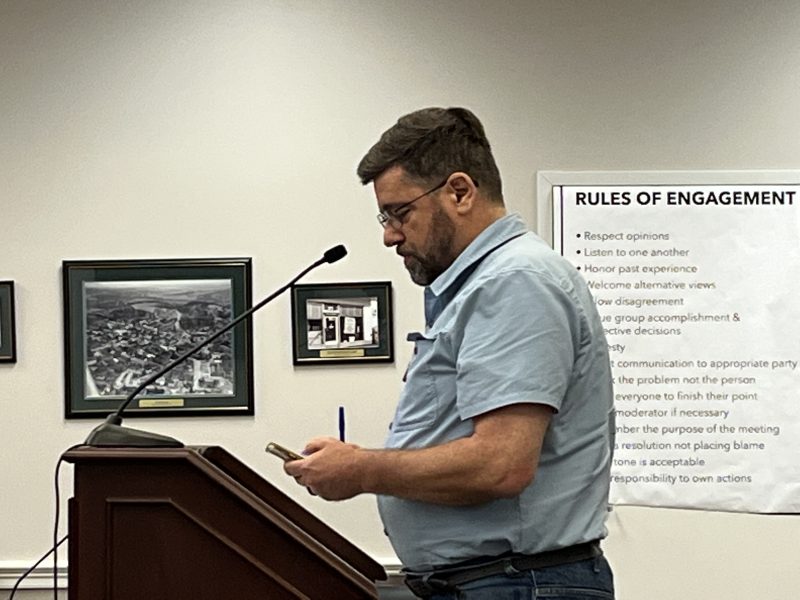

Under public comments, Tom Sayre stands up to address the council on what he perceives to be a pressing need for fiscal transparency, referencing a case from 2022 in which funds were appropriated under circumstances that Town Attorney George Sonnett explained were confidential after Councilwoman Amber Morris interrupted Sayre’s comment to call a point of order. The subject was what she called “alleged conduct,” and in her view, it would be inappropriate for the council to engage in such a comment in the context of a regular meeting. Sonnett encouraged the council not to engage the comment. They did not.
The word on the street is that the gymnasium will precede the sanctuary at 0 Criser Road. The intersection of Luray Avenue and West Main Street is a place of force on Sunday mornings, with much vehicular as well as pedestrian traffic, where St. John the Baptist Church is located across from Maddox Funeral Home. A secondary chapel could relieve that traffic somewhat and the gymnasium could be a resource for the Catholic homeschool community. It certainly sounds like a good thing for everybody.
Click here to watch the Front Royal Town Council Meeting of April 22, 2024.
Local Government
Town Council and Board of Supervisors Enjoy a Brief Liaison Committee Meeting
Having come out of a special meeting where they voted approval for a giveaway of trees purchased by the Town, the Front Royal Town Council joined the Warren County Board of Supervisors for a liaison committee meeting hosted by the county at 6 p.m. on Thursday, April 18 in the Warren County Government Center on 220 North Commerce Avenue. Mayor Lori Cockrell and Councilman Glenn Wood represented the council, while Chairwoman Cheryl Cullers and Supervisor Jerome Butler represented the board.


Town Council meets before the Town-County liaison meeting to hold a special meeting concerning permission to be granted to the Advisory Committee for Environmental Sustainability (ACES) to give away trees valued at $6218.75 with a $1000 delivery fee on Sunday, April 21, for an Earth Day event. This $7218.75 value, paid by the Town of Front Royal for trees that the Horticulture Department purchased, covers ACES’ free plant giveaway. The council unanimously approved the giveaway. Royal Examiner Photo Credits: Brenden McHugh.
The items on the agenda were, respectively, the issue of processing house violations and tenant and landlord enforcement, deferred to July; McKay’s Springs; the transportation and infrastructure committee; an update on school zone cameras; the water supply plan; and a boundary line adjustment for Town corporate limits on East/West Criser Road. The meeting was characterized by agreement and goodwill as the Town and County discussed these items that concerned them. At the same time, Town Manager Joe Waltz and County Administrator Edwin Daley provided them with the information they needed to transact the meeting.


Front Royal Town Council and Warren County Board of Supervisors meet for Thursday night liaison committee meeting at the Warren County Government Center.
Mayor Cockrell pushed for clarification on who exactly owns McKay Springs. Daley explained that three years ago, the Economic Development Authority (EDA) sold their portion to the County, thus reducing the stakeholders to two parties, the Town and the County, both of whom currently own portions and a portion they own together. Under the leadership of Daley and Waltz, the Town and the County are now exploring whether they might develop McKay Springs as a joint venture. The transportation and infrastructure committee would facilitate this discussion, and it would be merely a discussion based on information gathering. Cullers then guided the meeting towards the transportation and infrastructure committee itself. At that point, she and Cockrell mentioned reports from VDOT that the Town and County received separately.


Captain Zachary King of the Front Royal Police Department gives an update on school zone cameras to the liaison committee.
After they received an update about cameras in school zones from Captain Zachary King of the Front Royal Police Department and after they heard from Waltz about the annual determination of the Town’s excess volume in water and septic capacity, that is, capacity available for future development, the town manager explained the need for a boundary line adjustment on East/West Criser Road, where in a recent out-of-town service request it came to the Town’s attention that the boundary line does not reflect every segment of the road owned by the Town which, currently, owns segments that are outside of corporate limits, even though the Town owns all the land that East/West Criser Road is built on. The adjustment would bring all segments of the road into corporate limits as well as any segment marginal to the road that the Town already owns. There did not seem to be any resistance from the board to rectifying this oversight.
At 6:50 p.m., all agenda items having been addressed, the meeting was resolved with the determination to hold another liaison committee meeting in July.
Local Government
Town Planning Commission Tackles Motel-Apartment Conversion, Elects New Chairman
The Front Royal Planning Commission, presided over by Acting Chairman Connie Marshner in the absence of its former Chairman Daniel Wells, who submitted his resignation last week, met Wednesday, April 17, to hold public hearings on six Special Use Permit (SUP) applications. Acting Chair Marshner announced that an election for a new chairman would be added to the end of the agenda due to former Chairman Wells resignation. Commissioner Glenn Wood moved to add the election to the agenda, and Commissioner Michael Williams seconded. The commission voted unanimously for the addition.
There were no citizen comments from the nearly empty meeting room, and the commissioners voted unanimously to approve a one-item Consent Agenda, Authorization to Advertise for Public Hearing a single SUP submitted by Abode of Liberation for a lodging house at 1324 Old Winchester Pike.
There were seven public hearings:
Baymont Inn Apartment Conversion
The major business of the meeting was a pair of requests from CCC Enterprises LLC of VA for a property at 10 South Commerce Avenue, which was familiar to residents as the Baymont (former Quality Inn). First was a SUP application to convert the 3-story motel into a 39-unit apartment building. The property is zoned C-1, Community Business District.
Zoning Administrator Ware cautioned the commission that they were being asked to vote only on the proposed use for the property, not the site plan or other permits. The applicants presented a concept site plan showing a mix of one and two-bedroom units around green space and a swimming pool. The configuration as presented included 24 one-bedroom units, 2 one-bedroom with a den, and 12 two-bedroom units. However, the specific mix of units may change as the process moves forward. The applicants have not yet established pricing for the units, as it is too early in the process to determine. The applicants assert that the proximity of the property to the downtown area will be beneficial, as the tenant mix is intended to consist of young professionals and couples rather than families with children. The Planning Department summary indicates that this use is in conformance with the Town’s Comprehensive Plan and could provide badly needed housing. Commissioner Wood indicated “quite a bit of interest” in the project from downtown business owners, who will want to know “What type” of tenants the development would yield.
“What they do not want is for this to become low-income rentals”, Wood said. “I would suggest that as this process moves forward, you should be prepared to address that.” The applicant, Sam Sharma, told the commission that they were looking for local tenants only – predominantly “workforce” – cited as “teachers, firefighters, people who have restaurants on Main Street – that’s the goal we are trying to meet.”
At the public hearing, surprisingly, given the publicity for the proposal, there were no public comments either for or against it.


Sam Sharma, left at the podium, and Kyle Hopkins, the applicants for a Special Use Permit for the Baymont Inn property on Commerce Ave., address the Front Royal Planning Commission to explain their concept of a 3-story apartment structure to provide ‘workforce housing’ adjacent to the downtown area.
The Planning Department’s summary lists only one condition for the SUP: two parking spaces must be provided for each apartment. Acting Chair Marshner asked if “a third party” might be paying rent for tenants. Answer: “No.” After some discussion about the merits of the proposed use, on a motion by Commissioner Matthiae, seconded by Commissioner Williams, the commission voted unanimously in favor of a recommendation for approval by the Town Council.
The second request from CCC Enterprises LLC of VA is a request for a Special Exception for the property also located at 10 S. Commerce Avenue, identified by Tax Map 20A8-22-6, for a reduction in the required parking space size from 10 x 20 feet to 9 x 18 feet, and a reduction of the required parking area setback of thirty feet (30’) from the property lines. The property is zoned C-1, Community Business District. Approval of this exception is a condition of the CUP for the use as apartments, as the property could not be redeveloped under this proposal if the parking changes were not approved. Zoning Administrator Ware explained the requirement to the commission and showed that a boundary setback of 30 feet would eliminate the majority of parking spaces. As proposed, the parking spaces combined result in “a few more” than the 78 required.


Artist’s conception of a 39-unit apartment building where the Baymont Inn now stands at 10 South Commerce Ave.
After further discussion, Commissioner Matthiae made a motion, seconded by Commissioner Wood, to recommend approval. The vote for approval was unanimous.
Other Business
In other public hearings, Karen Reynoso has submitted a request for a Special Use Permit to allow a short-term rental at 1400 Old Winchester Pike. Zoning Administrator John Ware told the Commission that the application and the property were in full compliance with the Town’s ordinances. The property is zoned Residential (R-2). With no discussion on a motion by Commissioner Wood, seconded by Commissioner Brian Matthiae, the commission voted unanimously to recommend approval.
Short Street Properties LLC is requesting a SUP to allow a ground floor dwelling unit at 519 Short Street; the property is zoned C-1, Community Business District. In the business districts residential dwellings are only permitted by SUP. Zoning Administrator John Ware told the commission that this property has a Residential structure in the front of the lot and a commercial use shop in the rear. Due to fire damage, the property has not been occupied for over two years, and the applicant intends to renovate it inside and out


Permit applicant Chris Grady tells the Town Planning Commission that he plans to renovate a property at 519 Short Street as two dwelling units.
Under the town’s zoning ordinance, if a legally nonconforming use has been discontinued for two years, it must be brought into compliance with the current standard. Since the Commercial District allows ground-floor dwelling units only by SUP, the applicant has submitted the request. Property Owner Chris Grady addressed the commission and described the project to restore the vacant, burned-out property to two dwelling units. There were no speakers either for or against the request. Commissioner Wood asked about the presence of stored vehicles at the back of the property, and the applicant said that the owner had agreed to clean up that area prior to closing. The applicant asked if there was a danger that a permit for the use could be denied once the purchase and renovations were complete. Town Planning Director Lauren Kopishke said that was the reason for getting the Special Use Permit before the work is completed, to reduce the denial risk for the applicant. After further discussion on Commissioner Natthiae’s motion, seconded by Commissioner Wood, the commission voted unanimously to recommend approval.
Edwin S. Wright submitted a request for a Special Use Permit to allow a ground-floor dwelling unit at 514 South Royal Avenue. This property is zoned C-1, Community Business District. It was previously in use as a residential dwelling but has been vacant for several years. The applicant plans to renovate the property with two dwelling units, One a 4-bedroom 2-story, and one a basement 2-bedroom. As with the previous SUP request, the legally non-conforming property must now comply with the current Zoning Ordinance to re-establish the residential use. There were no speakers at the public hearing. During the discussion, Commissioner Williams asked if the requirement for parking spaces in the town ordinance had to be met before the permit was issued. Zoning Administrator Ware said that parking spaces were a requirement for permit issuance. On a motion by Commissioner Williams, seconded by Commissioner Wood, the commission voted unanimously to recommend approval.
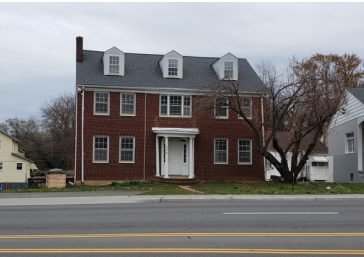

Edwin Wright submitted a proposal for a special use permit for this building at 514 S. Royal Ave for two dwelling units. The Planning Commission voted to recommend approval.
Edwin S. Wright has also submitted a request for a SUP to allow a ground-floor dwelling unit at 512 S. Royal Avenue. The applicant is renovating the property immediately adjacent to the previous plot. The applicant’s plan calls for this formerly derelict building to be converted to two one-bedroom dwelling units, one on the main floor and one in the walkout basement. The property is zoned C-1, Community Business District. As with the previous request, the SUP was required because the legally non-conforming use had expired when the property was vacant. With little further discussion on a motion by Commissioner Matthiae, seconded by Commissioner Wood, the commission voted unanimously to recommend approval. Commissioner Williams and Wood expressed their appreciation for the applicant’s efforts to improve the highly visible properties at the south entrance to the town that desperately needed it.
Chris King-Archer has requested a SUP to allow a short-term rental at 331 Kerfoot Avenue. The property is zoned R-1, Residential District. The Applicant intends to have this 4-bedroom property as a whole-house rental. There were no speakers at the public hearing. The town ordinance for short-term rentals requires one off-street parking space per bedroom, and there are currently only three parking spaces on this property. The planning staff recommended disapproval for that reason, but Commissioner Williams asked the applicant if adding another parking space to comply with the town ordinance was possible. The applicant indicated that it was possible but questioned the consistency of the ordinance application, citing the case of a nearby short-term rental property with no off-street parking.
Planning Director Kopishke explained that the Planning Department could not recommend approval if there were insufficient parking under the ordinance, and in the case the applicant cited, the commission had recommended denial for that reason, but the town council approved it anyway. Town Council can overrule its own ordinance. Town Attorney George Sonnett told the commission that a commissioner could offer a substitute motion to recommend approval, providing that the applicant would provide the additional parking space required by the ordinance. With little further discussion on a motion offered by Commissioner Williams and seconded by Commissioner Wood, the commission unanimously recommended approval of the suggested substitute motion.
After the public hearings, Commissioner Wood nominated Vice-Chairman Connie Marshner as permanent chair to serve the remainder of former Chairman Wells’s term. Commissioner Williams seconded, and the commission voted unanimously for Marshner’s chairmanship.
Planning Director Kopishke reported to the commission that there were 267 walk-in customers to the Town Planning Department in March, 25 zoning permits, 15 business license applications, and 5 code enforcement cases. She also said that the department hopes to have a draft rewrite of the Town Zoning Ordinance in the hands of the commission by the end of June. The rewrite of the ordinance is the last major part of a multi-year fundamental rewrite of the town’s planning and zoning infrastructure, which included updating the Comprehensive Plan and its components.
Another surprise was in store at the end of the meeting when Commissioner Glenn Wood announced his resignation from the board, effective May 16th. The commission “regretfully” voted to accept the resignation and wished Commissioner Wood well.
An urgent reminder: The planning department is recruiting for new Planning Commission Members (now 2). Check out the town website for the application form.
The meeting adjourned at 8:21 p.m.
Click here to watch the Town of Front Royal Planning Commission Meeting of April 17, 2024.
Local Government
Supervisors Approve Three Service Contracts, Debate Liaison Committee Structure
Near the opening of its regular meeting of Tuesday, April 16, the Warren County Board of Supervisors was introduced to new officers and support staff by Sheriff Crystal Cline; board and staff reports followed prior to routine monthly business. Portions of the reports, particularly from Fork District Supervisor Vicky Cook and County Administrator Ed Daley, focused on efforts to further cut departmental or outside agency operational requests in an attempt to balance the County’s Fiscal Year-2024-25 budget without the necessity of additional tax hikes to what has already been forwarded by the board.


Sheriff Crystal Cline, at podium, introduces new deputies and staff to supervisors as she continues to finalize departmental personnel structure. Below, the supervisors continue to ponder expenditures as they attempt to balance tax-based revenue with departmental and outside agency service providers FY-25 budget requests. Royal Examiner Photos Roger Bianchini
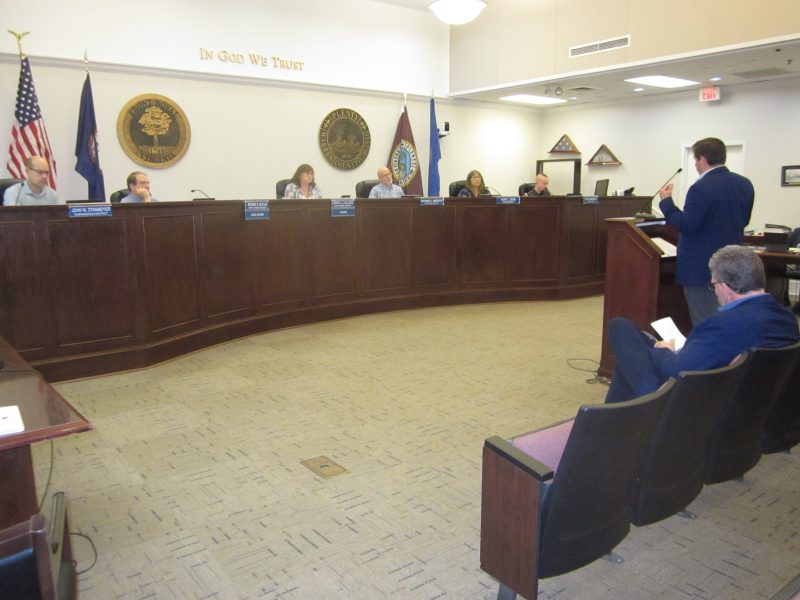

As reported of last week’s special meeting of the board, facing a $7.5 million revenue shortfall on the initially proposed FY-25 budget, the board has targeted tax hikes adding $4 million of revenue, leaving a $3.5-million shortfall the board seems committed to eliminate through further cuts to what they consider non-essential departmental or outside agency requests.
And speaking of requests, the board’s “Unfinished Business” opened the action portion of the meeting agenda with three staff presented contract proposals. Two of them were for renewals or updates of existing contracts, and one regarding tourism promotion from a Request For Proposal (RFP) issued by the County. Those contract items were, in the order presented:
- Contract – ACOM, LLC Contract for Technical Services – staff presentation by Todd Jones, IT Director (20:50 linked video mark); on a motion by ‘Jay’ Butler, second by John Stanmeyer, approved by a 4-1 vote, Ms. Cook dissenting.
- Contract – Earthdiver, LLC Contract for Tourism Website – staff presentation by Joe Petty, County Director of Economic Development (1:05:53 video mark); on a motion by Ms. Cook, second by Richard Jamieson, approved by a 5-0 vote.
- Contract – Civicplus, LLC Renewal of Annual Term Contract – staff presentation by Todd Jones, IT Director (1:09:48 video mark); on a motion by Ms. Cook, second by Mr. Butler, approved by a 5-0 vote.
While the latter two proposals were approved after brief discussions by the board following the staff summaries, the ACOM LLC computer tech services contract drew a lengthy inquiry and questioning of contract dynamics from Fork District representative Cook (beginning 32:42 video mark). The Fork District representative seemed troubled by the condition allowing the contractor to approach the board for additional funding if its annual cap, $35,000 in current FY-2023/24, $34,000 of which has been spent to date Jones told the board, was surpassed. Her mind did not seem eased by the fact a board of supervisors majority must approve the requested additional funding, as well as approve any IT project that arose where funding over $50,000 would be required, as in IT wiring to a new building. IT Director Jones noted the contract wording had been crafted to allow other Virginia municipalities to access needed IT services from ACOM through the Warren County contract. Jones noted such open contracting was a common practice in the state, and helped achieve the best possible pricing through the multiple municipal contracting availability.
The board also heard from ACOM principal Rob Adanitsch (23:50 video mark), who noted the company engaged in proactive community projects like IT instruction for high school students through Samuels Public Library, and contributions to tech-based student scholarships.


Staff, including IT Director Todd Jones at podium and applicant, seated, listen as Supervisor Vicky Cook, top left, questions financial variables in ACOM LLC Technical Services contract renewal request. Below, ACOM principal Rob Adanitsch explained his company’s services and community involvement in bringing IT educational instruction to local students through Samuels Public Library, as well as tech-related scholarship contributions. Four out of five supervisors liked what they heard.
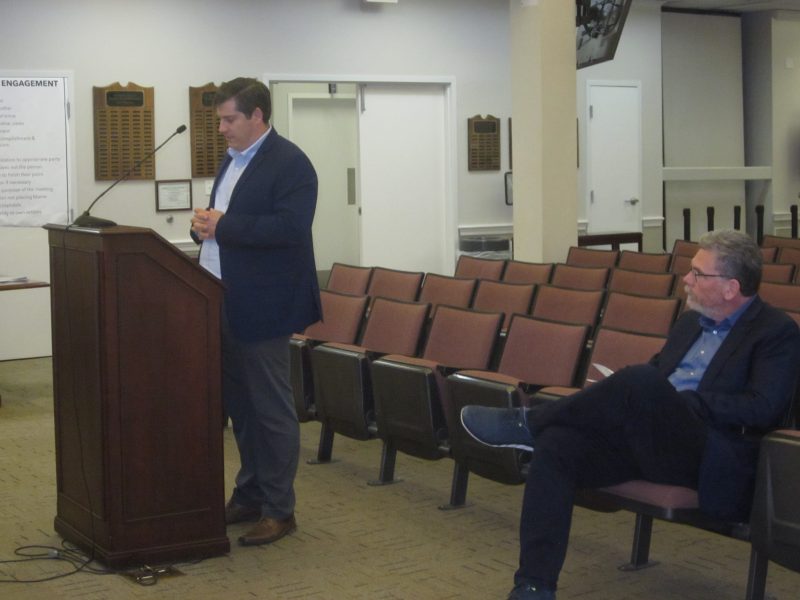

And as noted above, if not Cook, a four-member majority was satisfied with the contract’s dynamics, voting to approve the contract extension for another fiscal year.
On a motion by Mr. Stanmeyers, second by Mr. Butler, the board then unanimously approved a four-item Consent Agenda as presented. Three of those items were Authorizations to Advertise for Public Hearing hangar leases at the County’s Front Royal Airport (FRR), the fourth a Sole Source Award Notice precluding the necessity of issuance of an RFP on a specific pending item.
About that Liaison Committee
The meeting concluded with another somewhat lengthy exploration initiated by Supervisor Cook when Chairman Cullers asked if anyone had any “Additional New Business” to discuss (1:11:05 video mark). Cook expressed some confusion, not only on how board or council members not scheduled as official Town-County Liaison Committee members at a given meeting may offer input, but on the current structure of the liaison committee membership. The Front Royal-Warren County Liaison Committee, which generally meets quarterly, is composed on a permanent basis of the supervisors chairman and the town’s mayor, and one additional county board member and council-person generally rotated alphabetically by the first letter of their last name. The county administrator and town manager are also recognized as permanent members. Other supervisors and council members may attend Town-County Liaison Committee meetings as observers, with no authority to offer input unless recognized by the liaison meeting chairman. The meeting chairmanship is based on which municipality is hosting that quarterly meeting.
In response to Cook’s question on submitting input, Chairman Cullers recounted her experience as board chairman with the recent evolution of liaison committee meetings as the County and Town contemplated creation of a “Joint Tourism System”. She noted that while full board and council attendance had developed during the Joint Tourism discussion, the rules voted and agree upon in December were to return to the two-and-two board/council member format at liaison committee meetings moving forward. Consequently, she had communicated that non-participating board members should submit any questions or points they wanted discussed at liaison to her through the board clerk prior to the date of the next liaison meeting.


Board Chairman Cheryl Cullers, left, and Vicky Cook, right, were not on the same page on Town-County Liaison Committee structure and processes near the end of Tuesday’s meeting. County Attorney Jason Ham, below right, backed up Cullers explanation that the liaison committee has returned to the one-permanent (board chair and mayor) and one-rotating elected bodies liaison committee membership.
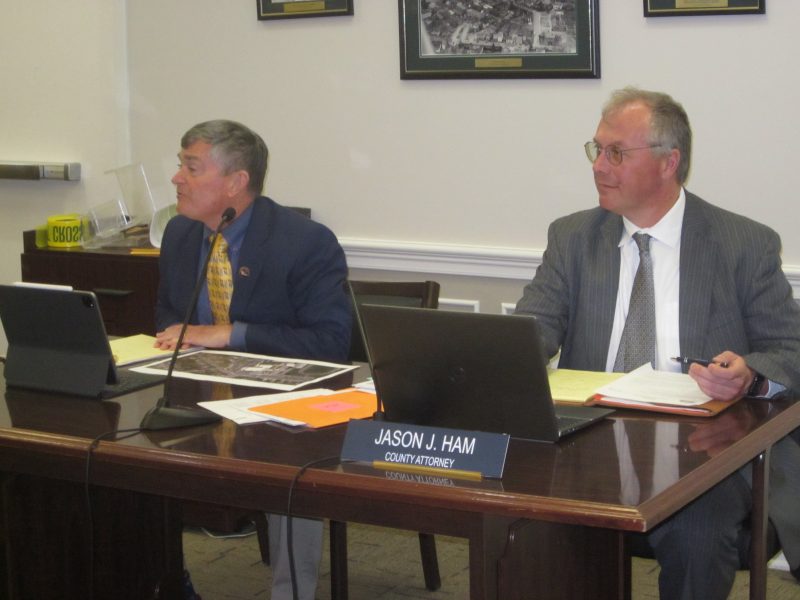

After County Attorney Jason Ham explained the legal rights of non-participating board or council members to attend and observe, but not speak unless recognized by the chair to do so, Cook insisted that full board and council membership was the existing structure of the liaison committee (1:17:40 video mark), to which both Ham and Cullers simultaneously disagreed. However, that did not initially deter Cook from continuing her comment based on an erroneous assumption she asserted she had written proof of.
Cook’s confusion seemed to stem from the fact she was allowed to speak at a liaison committee meeting she attended in January. Board Chairman Cullers explained to Cook that Mayor Cockrell, chairing that meeting hosted by the Town at Town Hall, recognized she had a question and had allowed her to pose it from the viewer’s gallery as a chairman may allow meeting rules to be exempted on occasion as they see fit.
And with that resolved the meeting adjourned just shy of 8:30 p.m.
Click here to watch the Board of Supervisors Meeting of April 16, 2024.


